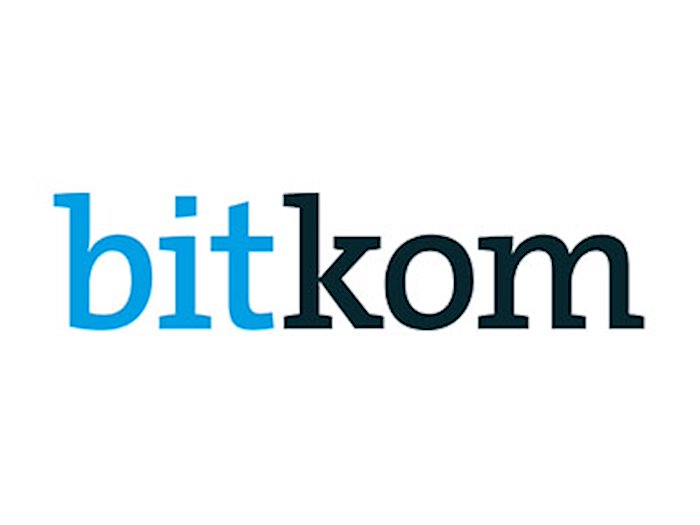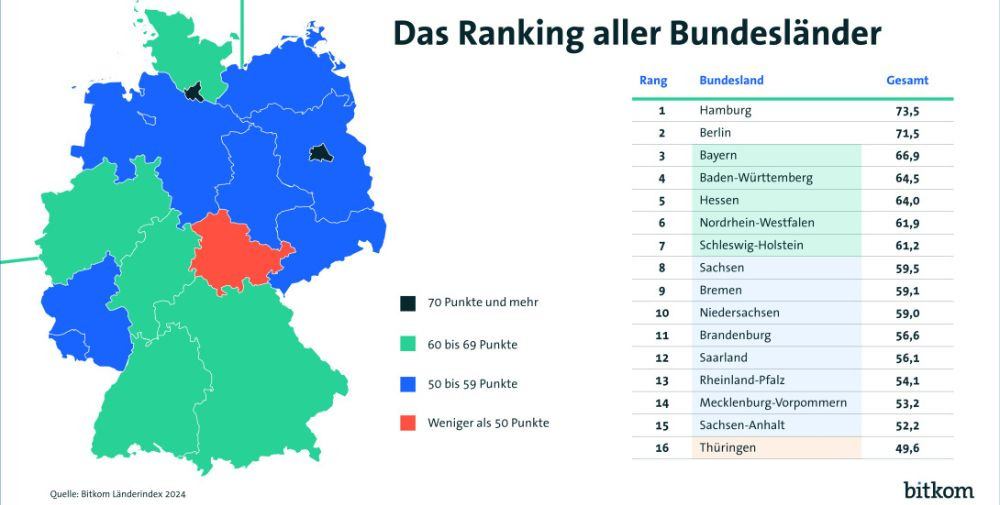
According to the survey, Hamburg achieved 73.5 out of a possible 100 points and second-placed Berlin 71.5 points. Bavaria follows at a slight distance, scoring 66.9 points. Fourth place in the overall ranking goes to Baden-Württemberg with 64.5 points. Hesse (64.0 points), North Rhine-Westphalia (61.9 points) and Schleswig-Holstein (61.2 points) follow in places 5 to 7. The federal states behind them achieve less than 60 points in the ranking: Saxony (59.5 points) in 8th place, Bremen (59.1 points) in 9th place and Lower Saxony (59.0 points), Brandenburg (56.6 points), Saarland (56.1 points), Rhineland-Palatinate (54.1 points) in 10th to 13th place.The last three places are occupied by Mecklenburg-Western Pomerania in 14th place (53.2 points), Saxony-Anhalt in 15th place (52.2 points) and finally Thuringia (49.6 points).
“The Bitkom State Index makes the 16 federal states comparable in terms of digitalization,” says Bitkom President Dr Ralf Wintergerst. “There are enormous differences between the digital leaders and the laggards. But most countries achieve top scores in individual areas.” Hamburg achieved a top position in the categories of digital infrastructure and digital administration, while Berlin scored particularly well in the digital economy category. But even beyond the city states, the federal states are among the pioneers in individual categories: Mecklenburg-Western Pomerania, for example, is in first place in the digital society category. Schleswig-Holstein ranks second in the expansion of digital infrastructure, which is excellent for a large state.
Empirical survey of more than 5,600 citizens in all states
For the state index, Bitkom experts conducted a survey of all 16 state governments and evaluated a large number of third-party studies and official statistics. In addition, Bitkom Research conducted an empirical survey of more than 5,600 citizens, providing representative results for all countries. The data collected was incorporated into the four categories with a total of 26 indicators. “The Bitkom Country Index is intended to close a research gap,” emphasizes Bitkom President Wintergerst. “Above all, we want to identify progress and deficits in the digital policies of the 16 countries and make them comparable. Where are there best practices? What can the countries learn from each other? Where do we need more speed in digitalization? We can now answer these and other questions.”
Saxony, Saarland and other hidden champions
The four categories of the Bitkom State Index highlight the very different strengths and weaknesses of the federal states. For example, top-ranked Hamburg is ahead in the overall ranking and in the “digital infrastructure” category, among others, but only achieves 11th place in the “digital society” category. Saxony, on the other hand – in 8th place in the overall ranking – is in 3rd place in the “governance & digital administration” category. This means that citizens and companies in the eastern German state can complete an above-average number of administrative services online. The state government also has targeted measures in place to promote digitalization in Saxony, such as a digital cabinet that meets regularly and a “digital check” that examines new laws for their digital suitability as standard. Hesse has taken very similar measures and is only just behind Saxony in 4th place in this category. The state also scores highly with its independent digital ministry. Saarland, Germany’s smallest state, achieved second place in the “digital society” category – thanks to measures in the school sector, among other things. Wintergerst: “The differently distributed strengths and weaknesses of the states show that Everyone can learn from each other.” The top 3 in the individual categories at a glance:
Digital economy:
Place 1: Berlin (84.5 points)
Place 2: Hamburg (82.0 points)
Place 3: Bremen (70.8 points)
Digital infrastructure:
Place 1: Hamburg (84.9 points)
Place 2: Schleswig-Holstein (82.5 points)
Place 3: Berlin (81.0 points)
Governance & digital administration:
Place 1: Hamburg (64.0 points)
Place 2: Bavaria (60.0 points)
Place 3: Saxony (58.4 points)
Digital society:
Place 1: Mecklenburg-Western Pomerania (79.1 points)
Place 2: Saarland (77.4 points)
Place 3: Saxony (72.4 points)
City states perform better on average than territorial states
As the Bitkom Country Index further shows, certain aspects correlate with a good or negative position in the ranking. For example, city states or countries with a high population density tend to come out on top. A high gross domestic product per capita and a high number of companies and universities in the country can also be found in particular in countries with a high level of digitalization. The old federal states achieve an average index value of 63 points, the new federal states a value of 54 points. The three city states score an average of 68 points, while the territorial states only achieve 58 index points. “It is obvious that it is easier to expand fiber optic networks or achieve high 5G coverage more quickly with mobile phone masts in the densely populated city states. Nevertheless, states such as Schleswig-Holstein or Lower Saxony show that the expansion can also be decisively advanced in rural areas through political measures,” emphasizes Bitkom President Dr. Ralf Wintergerst. “Although there are certain structural features that promote progress in digitalization, political will and assertiveness are crucial.” For example, a digital ministry or a digital cabinet that meets regularly have a positive effect on the level of digitalization, as does a “digital check” for new laws, which 8 countries currently have. Progress is also faster wherever a political digital strategy is implemented by a central office in the state and monitored by a publicly accessible monitoring system. “The federal states are not dependent on the federal government or the EU, they have digitalization in their own hands,” Wintergerst concludes.
Create ecosystems for innovation and start-ups, implement OZG requirements
In order to make progress in the area of the “digital economy”, Bitkom recommends that the federal states create and strengthen ecosystems for innovation and start-ups, including through the targeted mobilization of private capital. “Those who support the domestic economy not only strengthen their competitiveness, but also make themselves attractive to start-ups and the urgently needed IT specialists,” emphasizes Bitkom President Wintergerst. In the area of “digital infrastructure”, it is particularly important to swiftly implement the already agreed federal-state pact to accelerate planning and approval and to anchor measures to accelerate the expansion of mobile communications and fiber optics in the state building codes.
In Bitkom’s view, independent digital responsibility at state level is indispensable in the state governments. The CDO or CIO of a state should deal exclusively with digitalization issues and not be assigned any other responsibilities. The implementation of the Online Access Act is also key. “The federal states must ensure the financing of administrative digitization even in a tight budget situation,” said Bitkom President Wintergerst. In view of the failure of the OZG amendment act in the Bundesrat at the end of March, the rapid creation of a compromise with substance that is capable of gaining a majority is urgently needed. “When it comes to the digitalization of administrations, the federal government, federal states and local authorities must pull together much more than before,” demands Wintergerst. “The federal states can also learn from each other. The digital wheel doesn’t have to be reinvented again and again.” For Bitkom President Dr Ralf Wintergerst, an important topic for holistic and successful digitalization in Germany is the promotion of digital participation in the federal states. The introduction of computer science and media education as a compulsory subject from secondary school level 1 is important in this context, as is the expansion of chairs for the didactics of computer science. Low-threshold offers to promote digital participation and digital skills must be introduced and expanded in all federal states.
In view of the results of the state index, Bitkom particularly welcomes the newly created Digital Ministers’ Conference of the Federal States (DMK), whose constituent meeting will take place this week. “The DMK must decisively advance the cooperation and coordination of the digital policy issues of the federal states. In order to fulfill this important task, the DMK should be ambitious internally and self-confident externally,” says Wintergerst. “For Germany to be a strong and competitive business location, we need equal conditions throughout the country, especially when it comes to digitalization.”
– – – – – –
Further links
👉 www.bitkom.org
👉 Bitkom Country Index
Graphic: Bitkom




